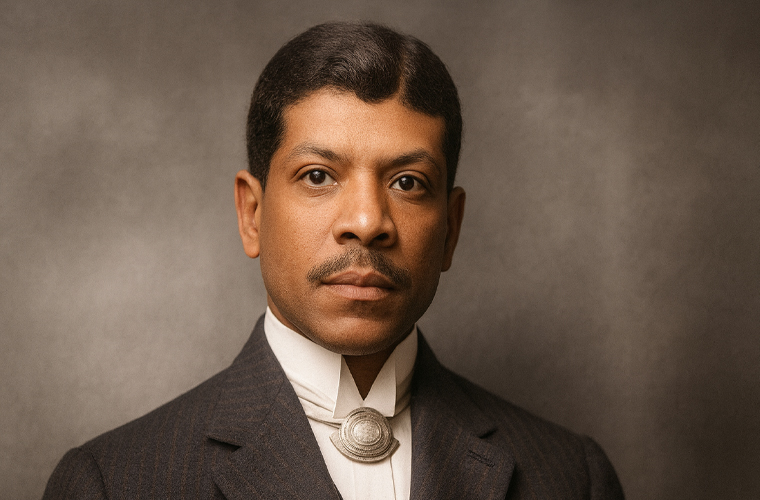Charles Clinton Spaulding, a towering figure in African-American business history, served as the driving force behind the North Carolina Mutual Life Insurance Company from 1900 to 1952. During his tenure, the company grew to become the largest African-American-owned business in the United States, earning Durham, North Carolina, the moniker “the Black Wall Street.” Spaulding’s leadership, marked by a relentless work ethic, innovative strategies, and a keen understanding of community needs, transformed the company into a beacon of economic empowerment for African Americans.
Born during the Reconstruction era in Columbus County, North Carolina, Spaulding grew up on his father Benjamin’s farm. Benjamin was not only a farmer but also a multifaceted entrepreneur who worked as a blacksmith, carpenter, and even served as the county sheriff. From an early age, Charles absorbed his father’s example of tireless diligence, rising before dawn to work long hours on the farm. This instilled in him a deep sense of discipline and ambition that would shape his future endeavors.
In 1894, Spaulding left the rural farm life behind and moved to Durham to live with his uncle. To support himself, he took on a series of low-wage jobs, including bellhop, dishwasher, and waiter. Despite the demands of these roles, he pursued education during his limited free time, earning the equivalent of a high school diploma in 1898. That same year, he was appointed manager of a Black-owned cooperative grocery store. However, the store struggled, and when its owners sold their shares in 1899, it collapsed, leaving Spaulding with a $300 debt—a significant sum for the time.
Spaulding’s perseverance and knack for management soon caught the attention of a group of seven Black entrepreneurs, including his uncle, A. M. Moore, and John Merrick, a prominent Durham barber. In 1898, these men had founded the North Carolina Mutual and Provident Association, each contributing $50 to start the venture. Recognizing Spaulding’s potential, they hired him to sell insurance policies. By 1900, they appointed him general manager, a title that belied the fact that he was initially the company’s sole employee. Spaulding’s energy and vision quickly propelled the company forward. He built a robust network of agents across North Carolina, and by 1904, the company expanded its operations to South Carolina. Just four years later, in 1908, North Carolina Mutual boasted an impressive 100,000 clients.
Spaulding’s innovative marketing tactics played a key role in the company’s growth. He advertised life insurance policies on everyday items like medical thermometers and spittoons, ensuring the company’s name reached a wide audience. His strategies paid off, and by 1919, when John Merrick passed away, Spaulding was elected secretary-treasurer of the company. In this role, he restructured the organization, renaming it the North Carolina Mutual Life Insurance Company. Under his leadership, the company extended its reach to thirteen states and the District of Columbia.
In 1923, following the death of his uncle, A. M. Moore, Spaulding was named president of North Carolina Mutual, cementing his position as its de facto leader, a role he had effectively filled since 1900. By the late 1920s, Spaulding’s success had earned him national recognition. He received prestigious business awards and was invited to serve on President Herbert Hoover’s Federal Relief Committee, a testament to his influence and stature.
The Great Depression posed significant challenges for North Carolina Mutual, as it did for many businesses. Spaulding responded with characteristic adaptability, streamlining operations by cutting expenses and reducing staff. In a letter to W.E.B. Du Bois, he expressed a belief that the economic hardship of the Depression would forge a new generation of business leaders by compelling them to manage more efficiently. His foresight and pragmatic approach helped the company weather the crisis.
During World War II, Spaulding further demonstrated his commitment to both his community and the nation. He played a pivotal role in promoting war bonds to African Americans and invested a substantial portion of North Carolina Mutual’s funds in these bonds, supporting the war effort while ensuring the company’s financial stability. In 1948, Spaulding, by then a celebrated figure in American business, embarked on a tour of Europe. Reflecting on his travels, he wrote with gratitude about his life in the United States, stating, “I shall always feel grateful that my ancestors were transplanted to North America. It is the best place in the world that I have found to live and leave one’s mark.”
Spaulding’s life came to a close on August 1, 1952, his seventy-eighth birthday. His legacy, however, endured far beyond his years. Through his optimism, tireless work ethic, and financial acumen, he not only built North Carolina Mutual into a powerhouse but also inspired generations of African-American entrepreneurs. His leadership helped establish Durham as a hub of Black economic achievement, and his story remains a powerful example of resilience, innovation, and the transformative potential of determination in the face of adversity.

